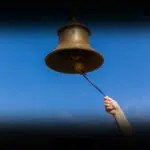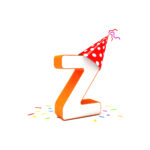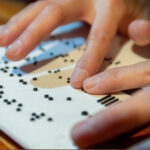Z Day is a mysterious yet intriguing day that occurs every January 1. Z Day is not zombies’ day. It’s a day when the alphabetical order is reversed, and those whose names begin with the letter Z come first in all matters of alphabet sequence. If your name is always called out last on the register because it starts with Z, today it’s going to be the other way around. Did you know, around 300 B.C., the letter Z was removed from the alphabet because it was considered useless?! Thankfully, it was returned to the alphabet, so that people named Zack didn’t have to be renamed Gack or Rack or Sack.
History of Z Day
The letter Z is the 26th and final letter of the modern English alphabet. It has different pronunciations in the different English dialects. In British English, spoken in the U.K. and Australia, it’s pronounced /zed/. In American English, it’s pronounced /zee/. In Hong Kong English and Cantonese, Z is pronounced /izzard/.
The seventh letter of the Hebrew alphabet is called ‘zayin’ and is used to represent the sounds /z/ and /dz/. ‘Zayin’ in Semitic means ‘weapon’ or ‘sword.’
The ancient Greeks copied their form of Z from the Phoenician ‘zayin,’ and it was called zeta. It had different pronunciations in the different Greek dialects. In the dialect spoken in Athens and Northwest Greece, it was pronounced /dz/, but later changed to represent /zd/ and /dz/ in the 4th century B.C. The Elean and Cretan dialects pronounced it as the English voiced and voiceless /th/.
The Latin version of Z was adopted from Etruscan Z and pronounced as /ts/. However, around 300 B.C., the sound /z/ was changed to /r/due to a process called rhotacism. It was then dropped from the Latin alphabet by the Roman Censor Appius Claudius Caecus. Its place in the alphabet was replaced with the new letter G. Later in the 1st century, Z was reintroduced to the Latin alphabet, along with the letter Y.
Before Z became the final letter of the modern English alphabet, there was a twenty-seventh letter, &. The symbol “&,” pronounced as “and,” was recited in Latin as “per se.” From being recited as “X, Y, Z, and per se and,” it became “X, Y, Z, ampersand.”
Z Day timeline
Z appears in the Semitic alphabet as 'zayin,' meaning weapon or sword.
Z is removed from the Latin alphabet by the Roman Censor Appius Claudius Caecus, through a process called 'rhotacism.'
Z is reintroduced into the Latin alphabet to represent the Greek sound 'zeta.'
The letter 'Z,' as the 26th letter of the alphabet, is followed by the symbol '&,' called the 'ampersand.'
Z Day FAQs
Why do Americans say zee?
Americans pronounce ‘see,’ in consonance with the pronunciation of other alphabets such as B, C, D, E, G, T. This pronunciation is derived from a late 17th-century English dialectal form.
Is the letter Z removed?
No, it’s not removed. Although it was removed in the Latin alphabet in 300 B.C., it has since been reintroduced.
What does a backward Z mean?
A backward Z is used in the Pitman Initial Teaching Alphabet (I.T.A.) to represent the hard ‘s’ found in words such as ‘is.’
How To Celebrate Z Day
Let people whose names begin with Z come first
This will work particularly fine if you are a teacher or a class tutor. Make the roll call in reverse order, starting with kids whose names begin with 'z.' This will give your kids a pleasant little surprise. It will be fun.
Watch a zombie movie
When you think of Z Day, what comes to mind first? Zombies! So, watching a zombie movie is one of the ways to celebrate Z Day. You can watch classics like “Night of the Living Dead” or newer ones like “World War Z.”
Take your Z friend out to lunch
If you have a friend whose name begins with Z, what stops you from treating them special on Z Day? You can use this opportunity to appreciate them, especially if they have been terrific friends. Give them a call, choose a restaurant or fast food, and have fun together.
5 Facts About Zombies We Bet You Don’t Know
Zombies originated from Haiti
Zombies originated from Haitian folklore in the 17th century, introduced by West African slaves brought to work on Haiti’s sugarcane plantations.
Mummies are not zombies
Mummies are preserved dead, while zombies are in a constant state of decay, making them different from each other.
The father of zombie
George A. Romero, accredited for bringing zombies into the mainstream, is considered the 'Father of the Modern Zombie.'
Cinematic zombies appeared first in the 1930s
Movies such as White Zombie in 1932 launched zombies into the cinematic limelight.
Zombie fans have a name
People who love zombies or zombie movies are called zombophiles.
Why We Love Z Day
It’s a day when the last becomes the first
The beauty of Z Day is that those whose names usually come last in matters of alphabetic sequence will, on this occasion, have them come first, temporarily fulfilling Jesus' promise, "The first shall become last and the last, first.”
Z Day can be fun
It is a day when you are at liberty to turn the alphabetical order upside down without any serious repercussions. Or so we think. Plus, you can have a Z-themed day: watch movies, wear clothes, and eat foods that start with Z.
Z Day makes people whose name starts with Z feel special
Imagine being a kid in school, and you have to always wait for other kids’ names to be called first before yours. That can be a downer sometimes, especially if you’re rushing to go home. On Z Day, the reverse can become true. Also, if you have a friend whose name begins with Z, be nice and treat them special on this day.
Z Day dates
| Year | Date | Day |
|---|---|---|
| 2025 | January 1 | Wednesday |
| 2026 | January 1 | Thursday |
| 2027 | January 1 | Friday |
| 2028 | January 1 | Saturday |
| 2029 | January 1 | Monday |



















































































































